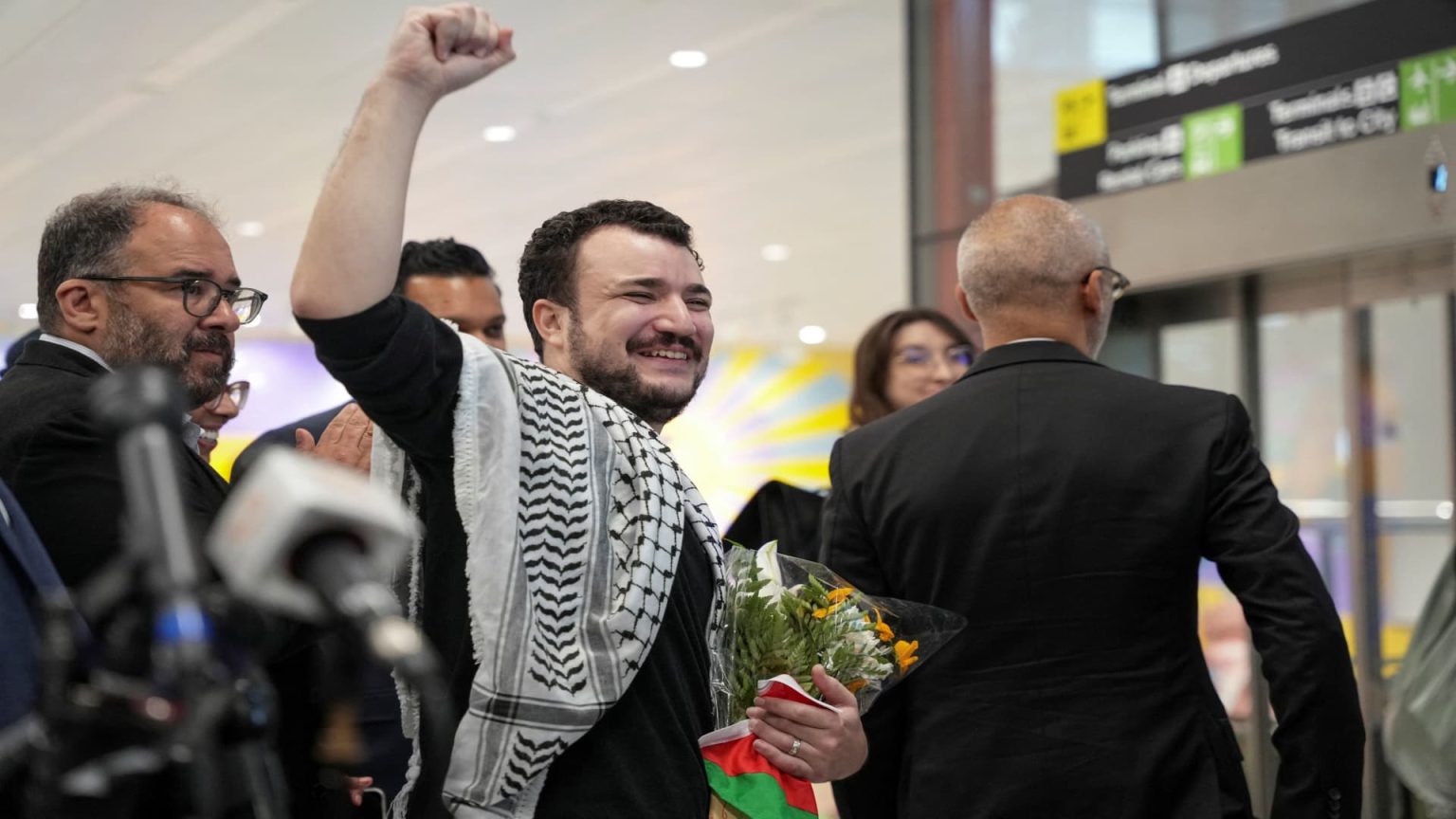In a striking turn of events, Columbia University student Mahmoud Khalil has returned to the New York area after enduring more than three months in detainment by Immigration and Customs Enforcement (ICE). Arrested in March under accusations related to his political activism, Khalil’s return comes amid growing concerns over civil liberties and political repression, particularly affecting those advocating for Palestinian rights. His release has sparked national discussions regarding the balancing act between national security and freedom of speech, as seen in the recent statements made by politicians and civil liberties organizations.
| Article Subheadings |
|---|
| 1) Background on Khalil’s Arrest |
| 2) Khalil’s Reaction and Messaging |
| 3) Political Reactions and Implications |
| 4) Details of Khalil’s Detention |
| 5) Wider Context of Activism and Detentions |
Background on Khalil’s Arrest
The tumultuous saga of Mahmoud Khalil began when immigration authorities apprehended him at the Columbia University housing complex in March. Initially a student activist advocating for Palestinian rights, the 30-year-old was swiftly escorted to a detention center in Louisiana, illustrating the government’s increasingly stringent measures against dissenting voices. The timing of the arrest coincided with Khalil’s participation in a significant protest against the ongoing conflict in Gaza, which has claimed numerous lives. His case stands out as particularly egregious due to the methods employed by immigration authorities in apprehending individuals involved in political activism.
Khalil’s Reaction and Messaging
Upon his return to Newark International Airport, Mahmoud Khalil spoke defiantly to reporters and supporters, stressing the urgency of the Palestinian plight. “Your messages have kept me going,” he asserted, highlighting his commitment to ongoing protests. Khalil’s words were laced with conviction as he criticized the U.S. government’s role in funding what he termed a “genocide” in Gaza. Standing alongside his wife, Dr. Noor Abdalla, and Congresswoman Alexandria Ocasio-Cortez, Khalil made his sentiments known about the broader implications of his detainment. “Even if they would kill me, I would still speak up for Gaza,” he emphatically stated, showcasing his unwavering dedication to his cause.
Political Reactions and Implications
The aftermath of Khalil’s detainment has reignited a national debate surrounding civil liberties and political expression. Congresswoman Ocasio-Cortez condemned Khalil’s arrest as politically motivated, emphasizing its implications on the First Amendment rights of all citizens. “Everybody agrees that persecution based on political speech is wrong,” she remarked, framing the detainment as an affront to democratic principles. As public sentiments swell against the government’s actions, Khalil’s situation acts as a catalyst for reform discussions on immigration policies and civil rights protections. His case invites scrutiny of the Trump administration’s stance on national security, positioning Khalil not just as a protestor but as a symbol of a broader movement for justice and free expression.
Details of Khalil’s Detention
During his time in the Louisiana detention center, Mahmoud Khalil faced severe emotional and psychological challenges. Reports indicated his unjust treatment during a period when he could not be with his wife, who gave birth during his incarceration. His brief statements upon release captured a mix of relief and bitterness: “Although justice prevailed, it’s long, very long overdue,” he expressed, reflecting on how the legal and immigration systems struggled to uphold civil rights. The accusations against him, which included claims related to his work history and political affiliations, raised questions about the validity and fairness of government procedures surrounding his detainment. A complex web of allegations was constructed from unverified sources, demonstrating the fragility of due process in politically charged scenarios.
Wider Context of Activism and Detentions
Khalil is not an isolated case; his arrest reflects a growing trend of political detentions in the U.S. targeting activists, especially those advocating for Palestinian rights. Following Khalil, the plight of other international students and scholars, such as Rümeysa Öztürk and Mohsen Mahdawi, reveals a disturbing pattern of suppression. Their apprehensions, often under dubious circumstances, further highlight the precarious position that political activists find themselves in today. The resultant public outcry has galvanized a movement toward reassessing immigration policies, especially those that prioritize national security over individual rights. Such cases prompt a reevaluation of the administration’s motives and policies, leaving both the public and legal experts questioning the implications of these actions on civil liberties.
| No. | Key Points |
|---|---|
| 1 | Mahmoud Khalil was detained for over three months by ICE, raising civil liberties concerns. |
| 2 | Khalil protests the U.S. government’s funding of the conflict in Gaza and its impact on civil rights. |
| 3 | Political leaders, including Alexandria Ocasio-Cortez, condemned Khalil’s arrest as an attack on free speech. |
| 4 | Khalil’s case illustrates a pattern of targeting activists within the U.S. immigration system. |
| 5 | The controversy surrounding Khalil’s arrest has sparked a broader discussion on immigration reform and civil rights. |
Summary
The return of Mahmoud Khalil represents not only a personal victory for him and his family but also highlights significant issues surrounding civil liberties in the U.S. His experience has become a rallying point for advocates of free speech and political expression, particularly in the context of the ongoing struggle for Palestinian rights. The reactions from public figures and politicians underscore the broader implications of his case, encouraging a reevaluation of policies that risk infringing upon individual rights. As debates surrounding governance and activism continue, Khalil’s story is likely to serve as an important touchstone for those advocating for justice and reform.
Frequently Asked Questions
Question: Who is Mahmoud Khalil?
Mahmoud Khalil is a Columbia University student and political activist known for advocating for Palestinian rights.
Question: Why was Khalil detained by ICE?
Khalil was detained under accusations related to his political activism, which the Trump administration claimed threatened national security.
Question: What are the broader implications of Khalil’s case?
His case has sparked national discussions about civil liberties, freedom of speech, and appropriate governmental measures to handle political dissent.


